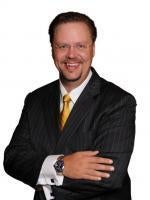I’d like to share with you an interview with one attorney who took what most lawyers can identify with as an adverse condition — grinding away at a practice he found unfulfilling — to reinvent himself and create a lifestyle law firm in a way that is truly inspiring.
Recently, our Director of Sales, Adam Reiman, sat down with Doug Thomas of Thomas Pollart & Miller LLC, a civil litigation law firm that provides legal services to businesses throughout Colorado, Nebraska and Utah, for an interview about how he has created a lifestyle law firm, one that allows him to not only enjoy his work but that also affords him the opportunity for real balance in his life. Enjoy!
AR: What inspired you to start your own law firm?
DT: I would say that the number one thing that inspired me to start my own law firm was independence. I was seeking a better lifestyle, I was seeking more independence and autonomy in my practice of law, and so that led me to start my own firm. Independence, autonomy, and a better lifestyle.
AR: And where were you before? Were you working for a larger firm before you started the firm?
DT: I actually was partners with another guy in a different law firm. We had 23 attorneys at the time I left, so we were a fairly medium-sized firm. And I think that I felt pigeon-holed. We did a lot of insurance defense work and it was a grind and I was looking for more independence and a better lifestyle.
AR: Can you share why you decided to pick the practice you’re in right now?
DT: Well, it was very pragmatic; it wasn’t ideological, it was pragmatic. The firm was looking to diversify its practice areas into other areas. And we had a senior attorney who had done divorce law and we looked around and had five or six attorneys that in the past or sometime in their career had done divorce. And it made sense for us to diversify to the family law area, so it was a very pragmatic reason for diversifying and starting the family law practice.
AR: Got it. And you’ve added in some other practice areas since that time, right?
DT: We subsequently added in a criminal defense practice. It’s a much smaller component, but again, it was a way to diversify and as we looked around the firm, we had a lot of attorneys that were either former district attorneys or former public defenders. And so the human capital was there. We had the expertise and all we needed to do was move forward with it. So, again, it was a very pragmatic reason for doing it and a very practical approach to it.
AR: Share with us if you can remember any good stories from back in the day when you first started out?
DT: Well, Adam, I have lots of good stories, but one of them I think about all the time that I kind of always remind myself about occurred right after we started the family law practice. We outsourced our SEO — search engine optimization — to a guy who came to us on a recommendation. Within six months of doing that, we were not only on the first page of Google, we were number one and we really thought we were kings of the world. And probably three months after that, Google changed its algorithm and we ended up on page 15.
AR: Uh oh.
DT: And it’s a reminder to me that in the world of law firm marketing and advertising, there is no cheap and easy ways, and if you think there are, eventually you’re going to get burned.
AR: Right.
DT: And every once in a while, I think back to that example, I think back to the struggle that we had to make to overcome that penalty. And so, while it’s not a good story as in a funny story or one of achievement, it is a good story in that it always reminds me that there is no cheap and easy ways to marketing and advertising.
AR: That’s a great cautionary tale. So, talk about how you fought your way back from page 15?
DT: The answer is you go back to the basics. You fight your way up from page 15 by doing everything above board. I obviously switched SEO vendors to a more reputable firm. Then you go back to the basics. And the basics are website content, blogging and videos and adding pages and you slowly grind your way back out of it.
AR: Talk about your growth the last few years as a firm – where you were and where you are today and what do you attribute to your success?
DT: So, the larger firm has grown from three attorneys and one paralegal to currently 32 attorneys. We now have 81 employees.
AR: Wow.
DT: Over the last 13 years, we’ve had considerable growth and I attribute that to having partners who can market. I also attribute that to having great management and I attribute that to having great people around us.
I think growth comes down to three things. First, there is marketing and advertising and sales. There is great management and leadership, and then there’s the people — the human infrastructure –that makes it all work. And, it takes all three of those things.
AR: I also think something that should be mentioned is part of that success also has got to be due to client experience and being different from your competitors. So, what are the things you think that differentiate your firm from your competitors and how would you describe your client experience?
DT: I think we come at it from the philosophical standpoint that we are really customer service representatives who happen to practice law. We’re not lawyers who try to give good customer service, we come at it from the angle that we’re really customer service representatives who just happen to practice law.
Everybody talks about service, but we try to drive it home through a philosophical standpoint that this is what we do. We can’t control the outcomes of trials, there’s a judge or a jury or someone else who may be controlling the outcome. But we can control how we react to everything along the way and we can control to some degree the customer’s experience.
And so, it’s really important for us impart to every single attorney that we are simply customer service representatives who happen to practice law.
AR: That’s a phenomenal philosophy, because it is unique and special in the legal space to hear somebody take that sort of attitude. Are there any client experiences as a result of your philosophy that you’re most proud of?
DT: All of our practices are essentially litigation-oriented. You go to court, you’re either doing jury trials or trials to judges. And, from an attorney’s standpoint, it isn’t always the most glamorous occupation. It’s often difficult; judges are cranky, clients are cranky.
And, I think any attorney who’s practiced litigation-orientated law — whether it’s divorce whether it’s criminal defense or whether it’s insurance defense — if you’re in court a lot, the thing most attorneys remember is a simple thank-you.
I can tell you that over the 25 years I’ve been practicing, that I have every single thank you card I’ve ever received in a drawer because there are not a lot of them. It’s a thankless position and I think most attorneys take great pride when a client thanks them.
And I think today, attorneys take great pride when they get a 5-star review somewhere. It makes them feel that they’ve done something beyond the practice of the law, that they’ve truly helped somebody and that the client appreciates it. So, if you ask me what I think what makes attorneys really tick and feel special, it’s a simple thank you or a great review.
AR: So do you have one in particular that stands out in those 25 years that you keep in your drawer and refer to when you’re having a bad day that helps turn your day around?
DT: To some degree, all litigation is contentious. You know, when you’re arguing and debating with the opposing attorney all day long, things are contentious.
One day, one of the opposing attorney’s paralegals called me and asked me for a favor, if I would give them some direction on a brief they were writing. It wasn’t on a case that I was against the attorney on, it was a totally separate case.
Now this was an opposing counsel I did not like and had never really liked, but I nevertheless helped the paralegal. I figured it wasn’t going to hurt to be a nice guy. I helped her with this brief, gave her direction and the next thing I know I got a thank-you card and Colorado Avalanche golf balls in the mail.
And it made me realize that even though there is a contentiousness to the opposing attorney, at the end of the day we’re all human and helping each other goes a long way.
AR: So what are some of the challenges you face as you’ve grown?
DT: I think growth itself creates challenges because in order for our law firm to grow, individuals have to grow as well. There has to be internal growth and human growth or else you can’t grow your law firm.
The legal profession has become very, very competitive. Marketing is more competitive and the drive for clients is more competitive, especially in Colorado because a lot of attorneys have moved here. We have high percentage of attorneys living in Colorado and it’s a very, very competitive environment.
To be able to maintain your sense of decorum and humanity while you grow and get through a very competitive environment is often difficult. And I think the practice of law has become a very competitive practice.
The other challenge I think that’s out there is the challenge of technology. Technology has probably influenced the practice of law almost as much as any other business. And I think it’s really important for attorneys in particular to keep up with technology in their day-to-day business and in marketing.
There is also a human challenge — the challenge of personal growth and how you manage people and your own time to live a balanced life.
AR: Is there anything else that you want to add?
DT: I think there is one other thing and that is that we all live in a community and have a desire to pay back to that community.
And so one of the things the firm does is we choose a charity every month. We have the employees give us all their favorite charities, then put them all in a hat and we draw 12 charities. Then, once a month, the employees can wear jeans to work, but only if they contribute $3 to the charity. On average. we raise about $250-300 every month for a new charity.
AR: Another great idea!! Thanks for your thoughts here, Doug, and thanks for your support of The Rainmaker Institute. We can’t do what we do without guys like you.
DT: All right, Adam. Thanks so much and, again, I have to say I’ve always appreciated everything The Rainmaker Institute has brought to our table as well.
To see the full interview, click here.




 />i
/>i

